VICHY — Families tell stories of hard work, past struggles, commitment to keep the farms in their families
Several families whose kinsmen labored and likely sacrificed over a time frame …
This item is available in full to subscribers.
We have recently launched a new and improved website. To continue reading, you will need to either log into your subscriber account, or purchase a new subscription.
If you are a current print subscriber, you can set up a free website account by clicking here.
Otherwise, click here to view your options for subscribing.
Please log in to continue |
|
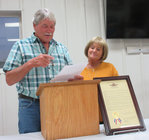
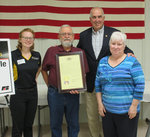
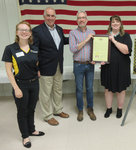
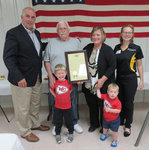
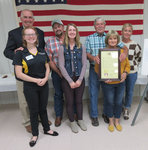
VICHY — Families tell stories of hard work, past struggles, commitment to keep the farms in their families
Several families whose kinsmen labored and likely sacrificed over a time frame spanning 100 years, gathered recently at the firehouse in Vichy for the annual Missouri Century Farm recognition dinner and ceremony.
There were two new Missouri Century farms added to the county’s growing list of 100-year heritage farms. Also present at Vichy that evening were three of the families who had Century Farm submissions in 2020. These families came to the firehouse to participate in the event because in 2020 the gathering was not held due to Covid-19.
Interim County Engagement Specialist, Rachel Buenemann, a nutrition and health specialist with University of Missouri Extension, began the evening’s program by thanking those who gathered. She said Century farms and ranches have shaped our nation and state. “In every kitchen, behind every barn door, and with every dusted pair of blue jeans lie stories of those who feed our nation.” The Missouri Century Farm program celebrates the lasting contributions farmers have made in our country and state.
Buenemann said the Centennial Farm project began in 1976 as part of the bicentennial of the American Revolution. The project awards certificates to person owning farms that have been in the same family for 100 years or more. Ten years later the University of Missouri Extension and MU College of Agriculture, Food and Natural Resources created the annual Century Farm program and recognition to sustain the project into the future. Since the program began in 1976, more than 8,000 Missouri farms have received the Century Farm designation. And, since 1976 when the first Maries County farm was designated, Maries County now has 99 century farms.
Dinner was provided as part of the event at Vichy. Maries County Extension Council member Gene Gillispie provided the blessing before the meal.
Bruce Sassmann of Bland, MO State Rep. 62nd District, was invited to the recognition event and provided a framed House Resolution to each of the honored families. He told them it is an honor to recognize this elite group of Missouri families. “I loved the stories, the narratives, and histories of each of these celebrated farms,” he said. “In many ways these Century Farms are the best of the best. They are celebrating an agricultural tradition of earning a living from the land while caring for the land to be passed down from generation to generation.” He said they have a reason to be proud of their accomplishment and 100 years of ownership can only happen with a special dedication to family and a passion for improving the land. “It is my great hope these family farms will be passed down to many more generations far into the future.”
He said each resolution continues with the farm’s history. “There are stories about 100-year-old wagon tracks, the homeplace and pink cabins.” The histories include the names of grandparents born two centuries ago and the names of family members who followed. “Each history includes the happiness and pain, strong wills, calloused hands, and a tenacious heritage,” Rep. Sassmann said.
John “Mickey” and
Ellie James Farm
John “Mickey” James and his wife, Ellie, have two century farms they received resolutions for at Vichy. James said the farms abut each other and are from the paternal and maternal sides of his family. He grew up in the middle fo these farms. He did not know his grandpas but knew both of his grandmothers. His Grandma Feeler married Jesse Gillispie, “a fantastic man.” His two grandmothers lived a half mile away from his home, each way. James said when “I felt abused at home I’d slip away to one or the other” grandmothers’ place. He said “I left home at age 18, having learned all that was possible.” It was at the age of 36 years that he began to be homesick for Missouri.
His dad went to St. Louis and got a job at General Motors. Mick James was about 13-years-old and he and his mother could handle the farm. His dad came home on weekends and he took time off in the spring to do the planting. “We managed,” James said.
His father bought the David and Belle James farm with Mick’s uncle and divided it and this is what James now has. It includes the James Community Church. It also has sprouts and chiggers.
The Arthur and Olivia Feeler farm they bought in the mid-1970’s and they got the James place when his mother passed away. “It’s home,” he said.
In the information James provided to Extension, he ended it this way: “Ellie grew up in Morgantown, West Virginia where her dad was a forestry professor at the University of WVA. After getting a degree in education at the University of Massachusetts, she accepted an offer to teach in California. One thing we seemed to share was a desire to travel. After marrying in California, we lived and worked in Washington five different times, New York, Michigan, New Mexico and spent 1983 working in Israel living in Tel Aviv. We have traveled in all fifty states and been in six continents. I hope to make the seventh, Antarctica, in February, 2022. Ellie declined after hearing of the very rough seas around Cape Horn. After retiring in 2004, we have been very happy living in Maries County.”
Rigsby Family Century Farm
Jami Rigsby-Jenkins of Rolla and Jason Rigsby of St. Louis, represented their families at the event. It was Jason who saved the deeds and who filed for the Century Farm designation.
It was their great-great-grandfather, James Thompson (Thomp) Powers, who started the farm before the Civil War. He was delivering a load of grain and stayed overnight in Tuscumbia when he overheard two men talking about filing on land he wanted. He hitched up in the middle of the night and made his way to Boonville, where the land office was located. He was found sitting with his back against the door when workers came to open the office. In addition to farming his homestead in Maries County, Thomp also had employment with the ironworks at Meramec Springs. There he met and married Margaret Westlake and had eight children. One of the children was Matilda Powers, who would become Jami and Jason’s great-grandmother.
Matilda was raised on the Powers farm in a house that survived not one, but two showdowns with bushwhackers during the Civil War. While her husband was away serving in the Missouri Home Guard, Matilda Powers single-handedly held off her intruders. She later married their great-grandmother, James Rigsby, and made a home on 80 acres gifted to them by Thomp and Margaret. It was here that their grandfather, Wellon Rigsby, was born in 1879. This is the farm owned by Jason Rigsby.
Their Grandpa Rigsby bought 100 acres in 1911, land that adjoined the Powers farm. He lived there with his mother. He married Evelyn Hollis in 1932 and the couple had four children who were born and spent their childhoods on this land. This is the farm owned by Jami Rigsby-Jenkins. Their father, Virgil Rigsby, became a man two weeks after his 11th birthday when his father, Wellon, died of cancer in the very house he built on the farm. He devoted his life to the acreage.
“Some of the greatest lessons we learned from him were to never be scared of hard work and to always cherish and revere this farm. Though he now lies at rest beside his father on the original Powers farm, his teachings are very much alive within us,” they wrote in information provided to Extension.
They are proud and honored to all of their ancestors and appreciative of the opportunity to have the farm and to be able to fight ticks and chiggers. “We are honored to be the next link in the chain connecting those who had, and those who will someday have, the Rigsby Family Century Farm.
Bade Family Century Farm
Don “Bodie” Bade spoke to the gathering about his family’s Century Farm. He teased that,“I was told I may have to say a few words.” He told about two Bade family farms.
The first is what they fondly call the “Homeplace.” It was purchased (160 acres) in 1886 by Joseph Bade, who is Bodie’s great-grandfather. Henry Herman Bade, Bodie’s grandfather, purchased the Homeplace in 1930. The Old Rolla-Springfield Road ran along this farm. Bodie said you can still see the old wagon trial, a ditch, worn into the earth by so many wagons using it. His grandfather Henry would tell the story of when he was a kid, the wagons would go through on their way to California. Some had signs saying “California or Bust.” Travelers would stop by at the spring and spend the night. His great-grandma, Sara Bade would offer them vegetables and herbs. “It was not an easy life,” Bodie told those gathered at Vichy. He said a lot of tragedies happened over the years.
The farm passed to Joseph and Della Bade who owned it from 1942 to 1980. It is now owned by Bodie Bade. Chaney Beltz and his wife, Tara, with their sons, Redding and Holt, live adjacent to this farm, which has been in the Bade family for 134 years.
The other Bade Century farm was purchased in 1903 by Henry Herman and Minnie Bade, who bought 376 acres off of what is now Highway Y. In 1946 Leonard Bade acquired this land from his father, Henry, and owned it through 1975. It is now owned by Bodie Bade. It’s been in the family for 117 years.
Henry built a log house after he purchased the property in 1903. This log house is still part of the home on the farm where Bodie and Vicki Bade now live. James Davis Beltz and wife, Danielle, with their son, Grady James, also live on this family farm.
Bodie said he was born in the old farm house. He thinks his people came up the river from Tuscumbia. The house was built well by Henry who was a tie hacker. Bodie still has his broadax. The Homeplace began for the Bade family in 1886, “It’s been awhile,” Bodie said. “We just farmed,” which he said is all his dad every did, except for working on the first pipeline using teams, which at times was dangerous. “A hard life,” Bodie said. “But no really easy life back then. We were poor, but all were poor back then.”
James Family Century Farm
Wayne and Alice James came to the podium representing their family. Wayne’s grandpa was Mike James’s dad’s brother. Their farms and Bodie’s farm are in the same area.
This Century farm began with Tom James and Ina Snodgrass James. In 1920 they purchased 342 acres. It is located on the Old Springfield Road overlooking the Gasconade River. As all farm families in the area, they raised their children by doing hard work on the farm using horse drawn equipment, growing fresh fruits and vegetables from their garden and fruit orchard and raising cattle, pigs, and chickens for sale and for food, as well as hunting wild game. His parents are buried in the James Community Cemetery.
In the early 1900’s there was a ravine on the farm, which still exists between two rock bluffs on the Gasconade River. It was used to slide ties down to the river. They were tied together and floated down the river to be used for construction of railroads. This is still known as “Tie Slide Ridge.”
Another landmark on the property on the bank of the Gasconade River is the “Pink Cabin.” It is recognized by floaters and motorboats as a halfway point between destinations and just a meeting place. The flood in the spring of 2017 got the pink house.
Wayne’s parents, Berthal and Hazel Terry James purchased the farm in 1980. They were lifelong farmers and are buried in the James Community Cemetery. Wayne and Alice Schwartze James purchased the farm in 1988. They refurbished the barns and outbuilding and added new machinery and storage buildings.
The old farm house has become a favorite gathering place during deer season and many tales are told of past and current deer and turkey hunting adventures. The farm has been good for the family. His grandpa did all his farm work with a horse and team. Many arrowheads have been found on this farm. The James family plans more years of making memories there.
At the end of the program, Buenemann thanked the cooks at the Vichy Firehouse for the fine meal and the cooks received a round of applause. She thanked the farm families for sharing and for continuing the agriculture tradition in Maries County.
Sponsors of the event include The Maries County Bank, Vienna Vet Clinic, Maces, and Mid-America Bank.